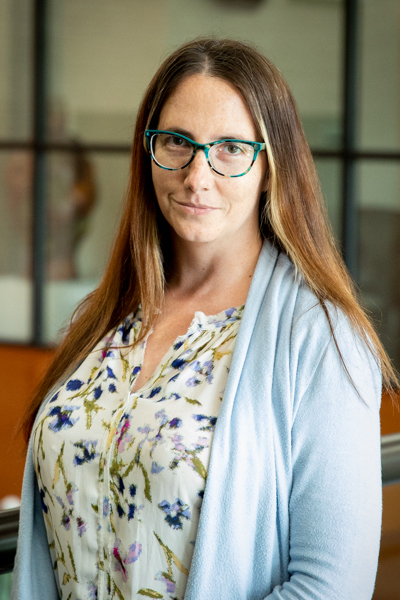During the course of the academic year, we’ll be sharing out Q&As completed by our newest faculty members in an effort to introduce them to our campus and School of Education communities.
Name: Megan Reilly
Title, including department and school: Assistant Professor, Department of Theatre & Drama, School of Education
Hometown: Nashua, New Hampshire
Educational/professional background: MFA, Theatre Design, University of Texas at Austin; 20 years professional lighting and projection design

Previous position (title, institution): Assistant Professor, Macalester College
How did you get into your field of research? I got into lighting design as an undergrad originally because I was honestly surprised that such a thing even existed. And I was even more surprised to find that there were people who were passionate enough about their major to stay up all night studying it. I stuck with it because it kept challenging me over the years, always showing me that I could never learn everything about how to use light as an art form. My current research in virtual and augmented reality is part of my projection and digital media interest and stems from my passion for immersive performance and a desire to explore the roles these technologies can play in live performance.
What attracted you to UW-Madison? I was attracted to UW-Madison both by the department’s reputation but also because of the research opportunities it afforded me. I love my professional work and do believe that creative work is research, but I also love academic research and was interested in working in a department where both sides of me would be welcome.
What was your first visit to campus like? It was a strange time because it was right at the precipice of the COVID-19 shutdowns. I think it was just starting to be talked about. I had a few on-campus interviews, and UW-Madison was the first, and the only one unaffected by COVID. I was really in love with the views of the lakes and could imagine how the city and campus looked in the summer.
What’s one thing you hope students who take a class with you will come away with? I want my students to come away with the confidence that they can be their own teachers. Because in my field, technology changes constantly, and none of us can afford to pay for classes every time a new piece of software or new light board comes out. You have to be fearless in terms of teaching yourself, and kind and generous enough to work to teach others.
Is there a way your field of study can help the world endure and recover from the COVID-19 pandemic that has affected the health, finances and lifestyle of so many? I believe that the entertainment industry has been sustaining us throughout the quarantine period because we are the ones creating the content you’re streaming on Netflix; we are the reasons you’re watching “Hamilton” on Disney+ or watching any number of live productions over Zoom. Going forward, theatre and storytelling are absolutely necessary for developing and maintaining empathy – research supports this. However, I also know that the entertainment field needs more support right now, because its workers are the ones whose lifestyles and finances are severely impacted. Without a vaccine or COVID under control, Broadway, cruises, theme parks, and film shoots can’t and won’t operate at full capacity.
Do you feel your work relates in any way to the Wisconsin Idea? If so, please describe how. Absolutely. Theatre artists have an enormous impact on the world outside of UW-Madison and theatre itself works to change the world by inspiring change in individual hearts. I can cite the example of the recent Broadway musical “Hadestown,” for which UW-Madison’s graduate Andre DeShields won a Tony award for Best Featured Actor in a Musical. That musical has touched and inspired so many people and brought hope at a time where everything feels hopeless. Lighting designers can work by influencing the emotions, psychology, and mood of the audiences watching those shows. I have to believe that these things can actually inspire individuals to change. On top of that, there is always technology and ways we can widen access to theatre. The COVID pandemic has created many virtual productions and made many theatres offer recordings of their shows online which has allowed people who normally would not be able to travel to New York or London the chance to see Broadway or the National Theatre. And I was part of a project last year that was looking to create an augmented reality headset that might allow audience members on the autism spectrum the ability to attend any production of a musical or opera and control their own sensory experience.
What’s something interesting about your area of expertise you can share that will make us sound smarter during video chats (and eventually parties)? If you watch “Westworld,” there is a growing push to create interactive and immersive personal experiences similar to that. While some people have researched the topic of ethics in immersive performance, it’s not something that widely discussed. Virtual reality actually has a code of ethics (from Metzinger, 2016) and it’s past time that we talk about something similar for immersive theatre.
Hobbies/other interests: This will likely be the most boring list of hobbies and other interests: travel, yoga, bullet journaling, reading and cats. I also draw and paint. Mostly right now I long to travel while bullet journaling with a cat on my lap.